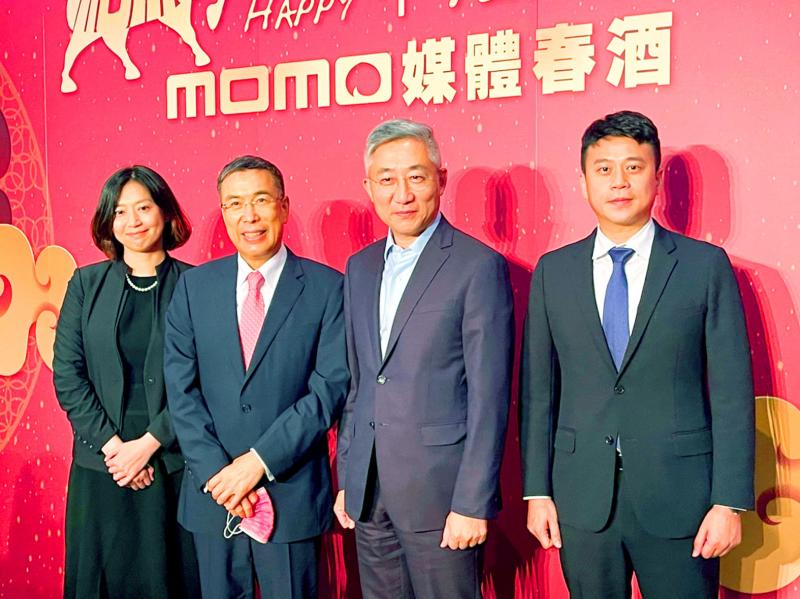E-commerce operator Momo.com Inc (富邦媒體) on Tuesday announced the construction of 10 satellite warehouses and a logistics center in southern Taiwan.
The infrastructure upgrades would help to lower costs and shorten shipping times for packages delivered to southern Taiwan, the company said at a media gathering.
“These new logistics upgrades will elevate our ability to deliver all across Taiwan,” Momo chairman Lin Chi-feng (林啟峰) said. “We anticipate the southern logistics center to begin operations in 2023.”

Photo: CNA
The firm launched its subsidiary Fu Sheng Logistics Co (富昇物流) in May last year so that it could operate its own fleet of delivery vehicles.
“We hope to increase the percentage of deliveries completed by Fu Sheng to 15 percent this year,” Lin said.
Northern Taiwan accounts for 60 percent of Momo’s orders, while central and southern Taiwan each account for 20 percent.
However, the company’s main logistics center and warehouse are in the north.
Packages destined for the south are dispatched from the northern logistics center, which is inefficient, the company said.
Momo has benefitted from the shift in consumer behavior driven by the COVID-19 pandemic, as consolidated revenue last year increased 29.65 percent year-on-year to reach a record NT$67.2 billion (US$2.37 billion) from NT$51.83 billion in 2019.
Thanks to improving operational efficiency and economies of scale, net profit last year increased 39.48 percent to NT$1.94 billion from NT$1.39 billion in 2019, with earnings per share rising from NT$9.95 to NT$13.87, company data showed.
On Tuesday, PChome Online Inc (網路家庭) announced that it would launch a share buyback program to reward employees, and proposed distributing a cash dividend of NT$1.3 per share to shareholders, which would represent a payout ratio of 60.19 percent.
PChome Online said that its board of directors approved a plan to buy back 1.5 million shares, or 1.27 percent of its outstanding shares, on the open market for NT$60 to NT$100 per share from yesterday to May 16.
The company added that it plans to reward employees with the repurchased shares over the next five years.
The e-commerce company reported that net profit last year increased 55.63 percent to NT$252.79 million from NT$162.44 million in 2019, with earnings per share increasing to NT$2.16 from NT$1.39.
Revenue last year increased 12.82 percent to a record NT$43.87 billion from NT$38.88 billion in 2019, company data showed.
This year, the company said that it aims to increase its customer base by offering points-based incentives, and to expand offline channels, from large chains to small stores.

South Korea’s equity benchmark yesterday crossed a new milestone just a month after surpassing the once-unthinkable 5,000 mark as surging global memory demand powers the country’s biggest chipmakers. The KOSPI advanced as much as 2.6 percent to a record 6,123, with Samsung Electronics Co and SK Hynix Inc each gaining more than 2 percent. With the benchmark now up 45 percent this year, South Korea’s stock market capitalization has also moved past France’s, following last month’s overtaking of Germany’s. Long overlooked by foreign funds, despite being undervalued, South Korean stocks have now emerged as clear winners in the global market. The so-called “artificial intelligence

‘SEISMIC SHIFT’: The researcher forecast there would be about 1.1 billion mobile shipments this year, down from 1.26 billion the prior year and erasing years of gains The global smartphone market is expected to contract 12.9 percent this year due to the unprecedented memorychip shortage, marking “a crisis like no other,” researcher International Data Corp (IDC) said. The new forecast, a dramatic revision down from earlier estimates, gives the latest accounting of the ongoing memory crunch that is affecting every corner of the electronics industry. The demand for advanced memory to power artificial intelligence (AI) tasks has drained global supply until well into next year and jeopardizes the business model of many smartphone makers. IDC forecast about 1.1 billion mobile shipments this year, down from 1.26 billion the prior

NEW IDENTITY: Known for its software, India has expanded into hardware, with its semiconductor industry growing from US$38bn in 2023 to US$45bn to US$50bn India on Saturday inaugurated its first semiconductor assembly and test facility, a milestone in the government’s push to reduce dependence on foreign chipmakers and stake a claim in a sector dominated by China. Indian Prime Minister Narendra Modi opened US firm Micron Technology Inc’s semiconductor assembly, test and packaging unit in his home state of Gujarat, hailing the “dawn of a new era” for India’s technology ambitions. “When young Indians look back in the future, they will see this decade as the turning point in our tech future,” Modi told the event, which was broadcast on his YouTube channel. The plant would convert

People stand in a Pokemon store in Tokyo on Thursday. One of the world highest-grossing franchises is celebrated its 30th anniversary yesterday.